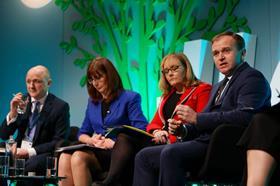
The lack of confidence that farmers have in Defra was clear for all to see at the Oxford Farming Conference last Wednesday. Secretary of state Andrea Leadsom’s speech on the government’s Brexit strategy failed to impress a room full of sceptical farmers at the annual event and both Leadsom and her departmental colleague George Eustice were frustratingly thin on detail when it came to issues such as seasonal labour and farming subsidies.
Leadsom had hoped to win support from delegates with eye-catching promises to cut Brussels red tape and do away with regulations like the three-crop rule, which obliges farms with more than 30 hectares of arable land to grow at least three crops. But when the audience was asked if the government has the right resources to make Brexit a success, Eustice’s was the only raised hand in the room.
Eustice, like his boss, remains a passionate Brexiteer. But delegates left the conference unsatisfied with the pair’s exit plan – largely because there doesn’t seem to be one. When pushed to give assurances on the continuation of farming subsidies in a panel discussion involving farming ministers from Scotland, Northern Ireland and Wales, Eustice was unable to go into the “specific policy details” – a phrase used by both Leadsom and Eustice on several occasions at the conference.
In the end it was Scottish environment minister Calum Kerr who stole the show, calling on Defra to talk more openly about the level of income they can expect in support payments beyond 2020 – until when Westminster has guaranteed the continuation of farming subsidies at current EU levels. The SNP minister’s assertion that Defra does not have a “strong enough voice” in cabinet to attract sufficient funding rang worryingly true – especially given the fact that it is competing with an underfinanced NHS.
As Kerr pointed out, “the treasury decides where the money goes” so it is up to Leadsom to explain “how she would change their mind”. Kerr does not hold out much hope given that she has previously argued against farm support. The SNP minister was referring to a 2007 blog post by Leadsom, in which she wrote “subsidies must be abolished”.
Also up for discussion at the conference was the impact Brexit will have on the devolution of agricultural powers. Welsh environment and rural affairs secretary Lesley Griffiths said she wants to see a distinct Welsh agricultural policy, with no “rowing back on devolution”, but she stressed the need to work in partnership with Westminster and the other devolved governments to get the best deal possible post-Brexit.
When the UK withdraws from the Common Agricultural Policy (CAP) we can expect some tussling between the home nations as they devise sovereign – or, in the case of the devolved nations, semi-sovereign – agricultural policies for the first time in over 40 years. While there was some agreement at the debate that Scotland, Wales and Northern Ireland must work within a broad UK framework on certain issues, it was clear that a blanket British policy on agriculture would not be welcomed by England’s neighbours.
These are uncertain times for everyone in British farming and the lack of policy detail from those in charge is becoming a real cause for concern. Yes, Brexit presents opportunities and yes there are aspects of the CAP that can be improved upon, but repeating the “Brexit means Brexit” mantra is not good enough. British farmers want some real answers.



